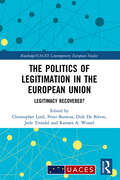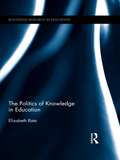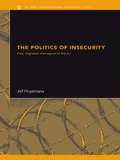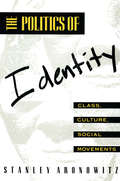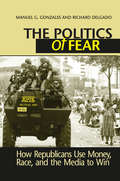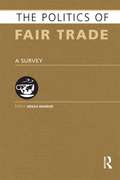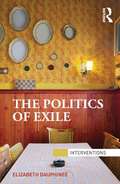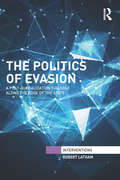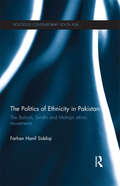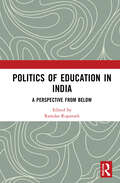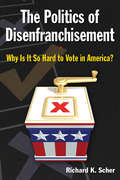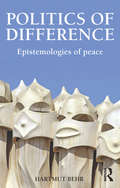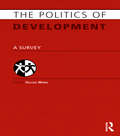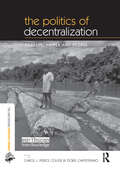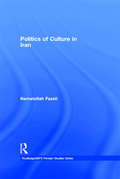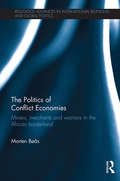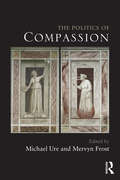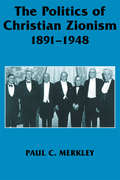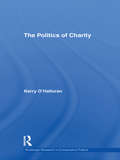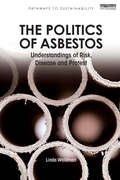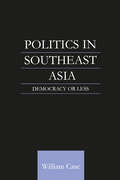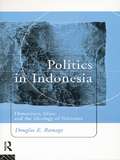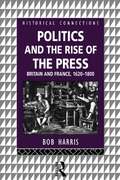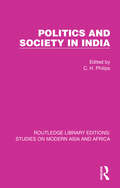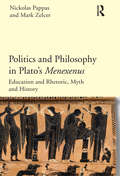Special Collections
Benetech’s Global Certified Accessible Titles
Description: Benetech’s GCA program is the first independent third-party EPUB certification to verify ebook accessibility. By creating content that is born accessible, publishers can meet the needs of all readers. Learn more: https://bornaccessible.benetech.org/
- Table View
- List View
The Politics of Legitimation in the European Union
by Christopher LordThis book examines and investigates the legitimacy of the European Union by acknowledging the importance of variation across actors, institutions, audiences, and context. Case studies reveal how different actors have contributed to the politics of (re)legitimating the European Union in response to multiple recent problems in European integration. The case studies look specifically at stakeholder interests, social groups, officials, judges, the media and other actors external to the Union. With this, the book develops a better understanding of how the politics of legitimating the Union are actor-dependent, context-dependent and problem-dependent. This book will be of key interest to scholars and students of European integration, as well as those interested in legitimacy and democracy beyond the state from a point of view of political science, political sociology and the social sciences more broadly.
The Politics of Knowledge in Education
by Elizabeth RataThis book explores the decline of the teaching of epistemic, conceptual knowledge in schools, its replacement with everyday social knowledge, and its relation to changes in the division of labor within the global economy. It argues that the emphasis on social knowledge in postmodern and social constructionist pedagogy compounds the problem, and examines the consequences of these changes for educational opportunity and democracy itself.
The Politics of Insecurity
by Jef HuysmansThe act of violence of 9/11 changed the global security agenda, catapulting terrorism to the top of the agenda. Weapons of mass destruction grabbed public interest and controlling the free movement of people became a national security priority. In this volume, Jef Huysmans critically engages with theoretical developments in international relations and security studies to develop a conceptual framework for studying security. He argues that security policies and responses do not appear out of the blue, but are part of a continuous and gradual process, pre-structured by previous developments. He examines this process of securitization and explores how an issue, on the basis of the distribution and administration of fear, becomes a security policy. Huysmans then applies this theory to provide a detailed analysis of migration, asylum and refuge in the European Union. This theoretically sophisticated, yet accessible volume, makes an important contribution to the study of security, migration and European politics.
The Politics of Identity
by Stanley AronowitzIn The Politics of Identity, Stanley Aronowitz offers provocative analysis of the complex interactions of class, politics, and culture. Beginning with the premise that culture is constitutive of class identities, he demonstrates that while feminist analyses of both racial and gay movements have discussed these components of culture, class contributions to cultural identity have yet to be fully examined. In these essays, he uses class as a category for cultural analysis, ranging over issues of ethnicity, race and gender, portrayals of class and culture in the media, as well as a range of other issues related to postmodernism.
Politics of Fear
by Richard Delgado and Manuel G. Gonzales"Lucidly written, widely informed, and uncompromisingly honest -- a valuable expose." Michael Parenti "Documents the stunning success of a network of wealthy donors and corporations in creating and sustaining a set of think tanks, legal action groups, and media strategies." Gary Orfield, Harvard University What explains the electoral success of Republicans, particularly of the ascendant neoconservatives who now dominate the Party? Based on a thorough and up-to-date examination of the New Right over twenty-five years, The Politics of Fear proposes some provocative answers, including globalization, new technologies, and a far-reaching network of right-wing think tanks and foundations. As the authors show, all have opened the doors to a new politics of fear successfully waged by the neoconservatives. By manipulating insecurity, the New Right has created an extraordinarily successful populist conservative movement. Utilizing extensive documentation, the authors argue convincingly that the fear of immigrants and racial minorities has served as the most effective tactic in the GOP arsenal, while their approach also implicates gays, feminists, and terrorists. The book explains why Americans have willingly supported a party that promises them security, just as it delivers greater economic and political insecurity. The authors argue that, despite their striking political successes, neoconservatives have delivered to voters a set of policies harmful to working Americans in the way of regressive tax measures, military exploits, tort reform, deregulation, and environmental destruction.
The Politics of Fair Trade
by Meera WarrierThe Politics of Fair Trade is a brand new title that explores the current issues in fair trade, featuring in-depth analysis by the leading experts in this field. Edited by Meera Warrier, this exciting title boasts case studies of the key commodities involved in fair trade issues, plus an A-Z of entries dealing with issues, organizations, disputes, and relevant countries with regard to fair trade.
The Politics of Exile
by Elizabeth Dauphinee"The most thought-provoking and refreshing work on Bosnia and the former Yugoslavia in a long time.It is certainly an immense contribution to the broadening schools within international relations." Times Higher Education (THE). Written in both autoethnographical and narrative form, The Politics of Exile offers unique insight into the complex encounter of researcher with research subject in the context of the Bosnian War and its aftermath. Exploring themes of personal and civilizational guilt, of displaced and fractured identity, of secrets and subterfuge, of love and alienation, of moral choice and the impossibility of ethics, this work challenges us to recognise pure narrative as an accepted form of writing in international relations. The author brings theory to life and gives corporeal reality to a wide range of concepts in international relations, including an exploration of the ways in which young academics are initiated into a culture where the volume of research production is more valuable than its content, and where success is marked not by intellectual innovation, but by conformity to theoretical expectations in research and teaching. This engaging work will be essential reading for all students and scholars of international relations and global politics.
The Politics of Evasion
by Robert LathamBurgeoning national security programs; thickening borders; Wikileaks and Anonymous; immigrant rights rallies; Occupy movements; student protests; neoliberal austerity; global financial crises – these developments underscore that the fable of a hope-filled post-cold war globalization has faded away. In its place looms the prospect of states and corporations transforming a permanent war on terror into a permanent war on society. How, at the critical juncture of a post-globalization era, will policymakers and power-holders in leading states and corporations of the Global North choose to pursue power and control? What possibilities and limits do activists and communities face for progressive political action to counter this power inside and outside the state? This book is a sustained dialogue between author and political theorist, Robert Latham and Mr. V, a policy analyst from a state in the Global North. Mr. V is sympathetic to the pursuit of justice, rights and freedom by activists and movements but also mindful of the challenges of states in pursuing security and order in the current social and political moment. He seeks a return to the progressive, welfare-oriented state associated with the twentieth century. The dialogue offers an in-depth consideration of whether this is possible and how a progressive politics might require a different approach to social organization, power and collective life. Exploring key ideas, such as sovereignty, activism, neoliberalism, anarchism, migration, intervention, citizenship, security, political resistance and transformation, and justice, this book will be of interest to academics and students of Political Science, Sociology, Anthropology, Law, Geography, Media and Communication, and Cultural Studies.
The Politics of Ethnicity in Pakistan
by Farhan Hanif SiddiqiIn order to understand the Pakistani state and government’s treatment of non-dominant ethnic groups after the failure of the military operation in East Pakistan and the independence of Bangladesh, this book looks at the ethnic movements that were subject to a military operation after 1971: the Baloch in the 1970s, the Sindhis in the 1980s and Mohajirs in the 1990s. The book critically evaluates the literature on ethnicity and nationalism by taking nationalist ideology and the political divisions which it generates within ethnic groups as essential in estimating ethnic movements. It goes on to challenge the modernist argument that nationalism is only relevant to modern-industrialised socio-economic settings. The available evidence from Pakistan makes clear that ethnic movements emanate from three distinct socio-economic realms: tribal (Baloch), rural (Sindh) and urban (Mohajir), and the book looks at the implications that this has, as well as how further arguments could be advanced about the relevance of ethnic movements and politics in the Third World. It provides academics and researchers with background knowledge of how the Baloch, Sindhi and Mohajir ethnic conflict in Pakistan took shape in a historical context as well as probable future scenarios of the relationship between the Pakistani state and government, and ethnic groups and movements.
Politics of Education in India
by Ramdas RupavathThis book studies the state of tribal education in India. India has the single largest tribal population in the world, yet the tribal community remains one of the most economically impoverished and marginalized groups in the country. The volume • Examines the educational status of the tribal population and studies developmental issues such as unemployment, illiteracy, caste discrimination, and inequality faced by the community. • Studies the implementation and execution of welfare schemes, initiatives, and reforms in place to tackle issues faced by tribal students and identifies loopholes in the various centrally sponsored schemes. • Emphasizes the importance of the Right to Education Act and presents policy implications for the educational uplift of India’s very many millions of tribal people. A critical study of the Indian education system, this book will be indispensable to students and researchers of education, education policy, minority studies, indigenous studies, sociology of education, and South Asian studies.
The Politics of Disenfranchisement
by Richard K. ScherWe think of our American democracy as being a model for the world--and it has been. But today it compares unfavorably in some respects, especially when it comes to the universal franchise. The right to vote is more conditional and less exercised in the United States than in many other mature democracies. As became clear to all in the presidential election of 2000, when the stakes are high, efforts to define voter eligibility and manage the voting and vote-counting process to the advantage of one's own side are part of hard-ball politics. It is that experience that gave rise to this book. Written by an author with wide expertise on Southern and Florida politics and districting, the book begins with a deceptively simple question--why is it so hard to vote in America? It proceeds, in seven chapters, to examine the ways that some people are formally or effectively disenfranchised, and to review how control of the ballot and the voting process is constrained, manipulated, and contested
Politics of Difference
by Hartmut BehrThis book develops a notion of differences and 'otherness' beyond hegemonic and hierarchical thinking as represented by the legacies of Western philosophical and political thought. In doing so, it relates to the phenomenological discourse of the twentieth century, especially to Georg Simmel, Alfred Schütz, Emmanual Lévinas, and Jacques Derrida, and drafts our understanding of difference as a genuine human experience of a social and political world that is in motion and transformative, rather than static and predictable. On this basis of temporalized ontology and its normative consequences, differences are drafted as a positive social and political force and as powerful capacities of transformation and change. In practical terms, this understanding is most important for our theorizing and acting upon peace, peace-building, and conflict solution. Differences now appear not as obstacle to peace and reconciliation, but as lively and constructive articulations of 'otherness' and as a positive power of transformation, emancipation, and change. This book will be of interest to students of international relations, philosophy and political theory.
Politics of Development
by Heloise WeberThe Politics of Development: A Survey provides an overview of the intrinsically political relations of development. It brings together essays written by experts in the politics of development and covers a range of significant and topical concerns: gender, race, indigenous development, social movements, religion, security, environmental concerns, colonialism and its legacies, migration, the political economy of development, trajectories in urbanization, and the agrarian question. It introduces and examines key concepts and approaches which have underpinned development, as well as the struggles it has engendered historically, and in contemporary contexts. This volume provides critical insights into the global politics of development and offers alternative analytical frameworks for understanding the relationships around development and inequalities. The Politics of Development: A Survey is organized in an accessible manner, catering to a wide audience (ranging from undergraduates at University level to practitioners and Non-Governmental Organizations [NGOs] engaged in advocacy as well as practical political aspects), and provides introductions to key issues and themes around contemporary challenges and opportunities in development. The title also includes an A-Z Glossary, covering key terms, organizations, concepts and actors in the politics of development.
The Politics of Decentralization
by Doris Capistrano and Carol J. Pierce ColferDecentralization is sweeping the world and having dramatic and far-reaching impacts on resource management and livelihoods, particularly in forestry. This book is the most up-to-date examination of the themes, experiences and lessons learned from decentralization worldwide. Drawing on research and support from all of the major international forestry and conservation organizations, the book provides a balanced account that covers the impact of decentralization on resource management worldwide, and provides comparative global insights with wide implications for policy, management, conservation and resource use and planning. Topics covered include forest governance in federal systems, democratic decentralization of forests and natural resources, paths and pitfalls in decentralization and biodiversity conservation in decentralized forests. The book provides in-depth case studies of decentralization from Bolivia, Ghana, Indonesia, Russia, Scotland, Switzerland, Uganda and the US, as well as highlights from federal countries including Australia, Brazil, Canada, India and Malaysia. It also addresses the critical links between the state, forests, communities and power relations in a range of regions and circumstances, and provides case examples of how decentralization has been viewed and experienced by communities in Guatemala, Philippines and Zimbabwe. The Politics of Decentralization is state-of-the-art coverage of decentralization and is essential for practitioners, academics and policy-makers across forestry and the full spectrum of natural resource management.
Politics of Culture in Iran
by Nematollah FazeliThis first full-length study of the history of Iranian anthropology charts the formation and development of anthropology in Iran in the twentieth century. The text examines how and why anthropology and culture became part of wider socio-political discourses in Iran, and how they were appropriated, and rejected, by the pre- and post-revolutionary regimes. The author highlights the three main phases of Iranian anthropology, corresponding broadly to three periods in the social and political development of Iran: *the period of nationalism: lasting approximately from the constitutional revolution (1906-11) and the end of the Qajar dynasty until the end of Reza Shah’s reign (1941) *the period of Nativism: from the 1950s until the Islamic revolution (1979) *the post-revolutionary period. In addition, the book places Iranian anthropology in an international context by demonstrating how Western anthropological concepts, theories and methodologies affected epistemological and political discourses on Iranian anthropology.
The Politics of Conflict Economies
by Morten BøåsConflict economies cannot be approached in isolation but must instead be contextualised socially and historically. These economies did not emerge in vacuum, but are part and parcel of the history of people and place. This book explores the informal and illicit extraction and trade of minerals and other types of natural resources that takes place in the 'borderlands' during periods of conflict. This type of extraction and marketing, often referred to as ‘conflict trade’ depends on a weak state, and works alongside the structures of the state and its officials. The book emphasises that conflicts do not start as competition over natural resources and in turn suggests that the integration of the extraction and marketing of natural resources only starts once fighting is well under way. Boas argues that although economic agendas are an integral part of African conflicts, the desire to accumulate is not the only motivation. Thus, in order to present a more comprehensive analysis of conflict we need to take into account political, cultural, and historical factors, in addition to the economic dimensions of conflict. This book will be of very strong interest to students and scholars of political economy, conflict studies, international relations and development.
The Politics of Compassion
by Mervyn Frost and Michael UreThis book provides a critical overview of the role of the emotions in politics. Compassion is a politically charged virtue, and yet we know surprisingly little about the uses (and abuses) of compassion in political environments. Covering sociology, political theory and psychology, and with contributions from Martha Nussbaum and Andrew Linklater amongst others, the book gives a succinct overview of the main theories of political compassion and the emotions in politics. It covers key concepts such as humanitarianism, political emotion and agency in relation to compassion as a political virtue. The Politics of Compassion is a fascinating resource for students and scholars of political theory, international relations, political sociology and psychology.
The Politics of Christian Zionism 1891-1948
by Paul C. MerkleyFor this book Professor Merkley has researched presidential archives, Jewish historical libraries and official Zionist records in the US and in Israel for evidence of the dealings between official Zionists and active Christian Restorationists. Much of this record appears here for the first time in print and is linked to the much better known history of the relationship between the official Zionists and the politicians and leaders of the US and Britain.
The Politics of Charity
by Kerry O'HalloranFor the first time since 1601, a number of leading common law nations have almost simultaneously chosen to revise and place on the statute books the law relating to charity. The Politics of Charity examines the reasons for this and for the varying legislative outcomes. This book examines the legal framework and political significance of charity, as developed within England & Wales, contrasts this with the experiences of other common law nations and explores the resulting implications for government/sector relationships in those countries. It suggests that charity law lies at the heart of the relationship between government and the non profit sector, that there is an unmistakeable political agenda driving charity law reform and that the differential in legislative outcomes reflects important differences in the policies pursued by the governments concerned. Looking at fundamentally different approaches of government towards the sector in the UK, Ireland, the US, New Zealand, Canada, Singapore and Australia, O’Halloran argues the results will have implications for the present workings of parliamentary democracy. The Politics of Charity will be a valuable resource for academics, regulators and legal practitioners as well as advanced and postgraduate students in law, politics and public policy.
The Politics of Asbestos
by Linda WaldmanAround the world, asbestos-related diseases are on the increase. Meanwhile, in many newly-industrialising and developing countries, asbestos use continues unabated. This book, based on anthropological fieldwork in the UK, India and South Africa, explores people's understandings of their illness, risk, compensation and regulation, contrasting these personal and community narratives with formal medical and legal understandings. Linda Waldman shows how the domination of medical and legal framings of risk and disease over those of workers, sufferers and activists can narrow the responses chosen by government. This provides important lessons for researchers, policy makers and regulators, demonstrating that opening up to alternative understandings can create more effective policy responses to move towards sustainability and social justice. Published in association with the Economic and Social Research Council (ESRC).
Politics in Southeast Asia
by William CaseThis volume provides an introduction to the politics of the five key southeast Asian states - Malaysia, Singapore, Indonesia, Thailand and the Philippines - and is intended as a textbook for undergraduate and graduate students taking courses on this subject. Using a comparative politics and political economy perspective, the author focuses in particular on the degree of democracy in the five countries, arguing that in all the countries considered democracy is, to varying degrees, imperfect. The book synthesises a wide range of scholarship, and presents the material in a concise and accessible way.
Politics in Indonesia
by Douglas E. RamagePolitics in Indonesia describes the attitudes, aspirations and frustrations of the key players in Indonesian politics as they struggle to shape the future. The book focuses on the role of political Islam; Douglas E. Ramage shows that the state has been remarkably successful in maintaining secular political institutions in a predominantly Muslim society. He analyses the way in which political questions are framed with reference to the national ideology, the Pancasila.
Politics and the Rise of the Press
by Bob HarrisPolitics and the Rise of the Press compares the rise of the newspaper press in Britain and France, and assesses how it influenced political life and political culture. From its social, economic and political sources, to its importance for the middling ranks in eighteenth-century British society, and its transformation after the French revolution. This detailed, comparative account, which also contains considerable original research on the early Scottish press, will be of value to all students of French and British history of the period.
Politics and Society in India
by C. H. PhilipsIndia inherited a system of representative and responsible government from Britain, a large part of which was incorporated in the new constitution of independent India. But in the early 1960s it was already becoming clear that this political system could not long continue without change; and the probability is that the change would be considerable. A system deriving its inspiration from a homogenous, tight little nation-state like Britain could scarcely fit a sub-continent of heterogeneous elements like India. Already, under a deceptively smooth surface, important changes in the nature of Indian political life were taking place. Originally published in 1963, the purpose of these collected studies was to explore, in the rapidly changing situation, the intimate relationship of Indian politics and society and to indicate the ways in which the deeper social and political currents were moving. As an aid in assessing the degree of change in the modern political life of India, several studies of traditional attitudes towards politics in the Hindu and Muslim empires are included, along with an assessment of the central meaning of the fundamental British statement of policy in the Montagu Declaration of 1917. Against this background, the greater part of the volume discusses the practices and trends of the previous few years.
Politics and Philosophy in Plato's Menexenus
by Nickolas Pappas and Mark ZelcerMenexenus is one of the least studied among Plato's works, mostly because of the puzzling nature of the text, which has led many scholars either to reject the dialogue as spurious or to consider it as a mocking parody of Athenian funeral rhetoric. In this book, Pappas and Zelcer provide a persuasive alternative reading of the text, one that contributes in many ways to our understanding of Plato, and specifically to our understanding of his political thought.The book is organized into two parts. In the first part the authors offer a synopsis of the dialogue, address the setting and its background in terms of the Athenian funeral speech, and discuss the alternative readings of the dialogue, showing their weaknesses and strengths. In the second part, the authors offer their positive interpretation of the dialogue, taking particular care to explain and ground their interpretive criteria and method, which considers Plato's text not simply as a de-contextualized collection of philosophical arguments but offers a theoretically reading of the text that situates it firmly within its historical context.The book will become a reference point in the debate about the Menexenus and Plato's political philosophy more generally and marks an important contribution to our understanding of ancient thought and classical Athenian society.
